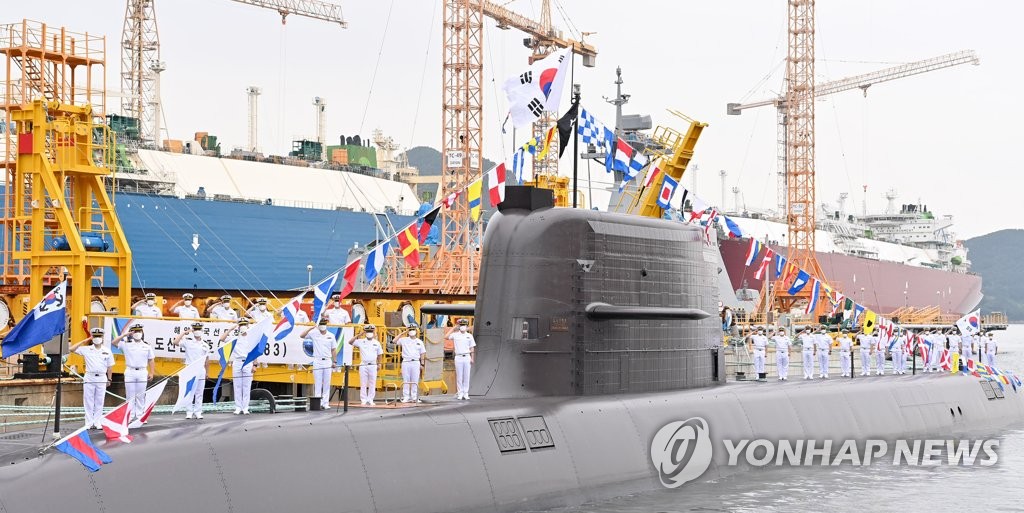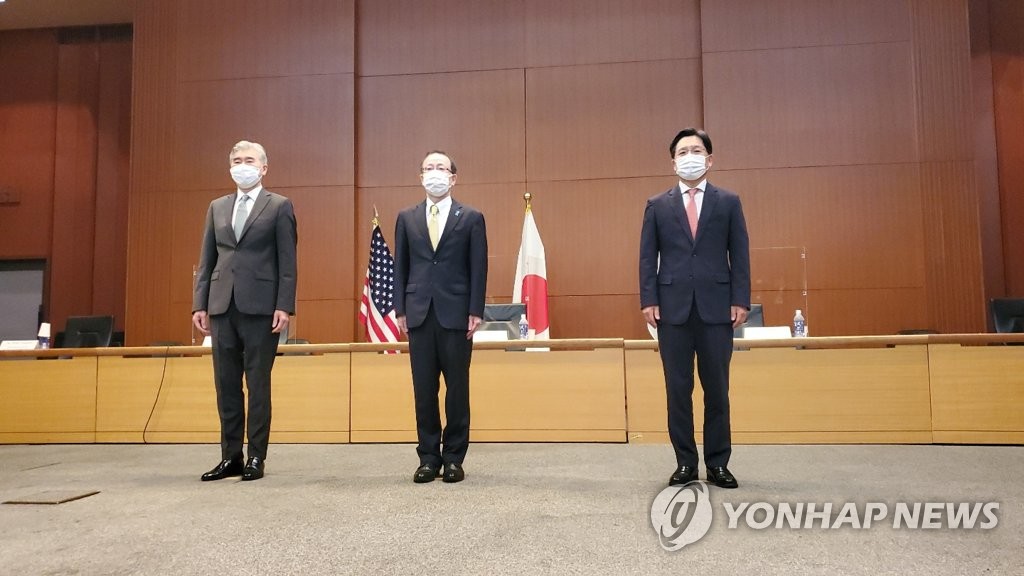WHILE ALL EYES LOOKED NORTH
S. Korea succeeds in testing ballistic missile launch from submarine: Cheong Wa DaeDefense September 15, 2021
SEOUL, Sept. 15 (Yonhap) --
South Korea has become the world's seventh country with an indigenous submarine-launched ballistic missile (SLBM), as it succeeded in an underwater test-launch from a submarine, Cheong Wa Dae announced Wednesday.
President Moon Jae-in inspected the firing at a local test center of the Agency for Defense Development (ADD), hours after North Korea lobbed two ballistic missiles into the East Sea.
The SLBM was fired from the 3,000-ton-class Dosan Ahn Chang-ho submarine at the ADD Anheung Test Center in South Chungcheong Province.
It flew a planned distance and precisely hit a target, Moon's office said.
"Possessing SLBM is very meaningful in terms of securing deterrence against omnidirectional threats and it is expected to play a big role in self-reliant national defense and establishment of peace on the Korean Peninsula, going forward," it said in a statement.

This file photo, provided by South Korea's Navy, shows the 3,000-ton-class Dosan Ahn Chang-ho submarine to be equipped with ballistic missiles.
President Moon Jae-in inspected the firing at a local test center of the Agency for Defense Development (ADD), hours after North Korea lobbed two ballistic missiles into the East Sea.
The SLBM was fired from the 3,000-ton-class Dosan Ahn Chang-ho submarine at the ADD Anheung Test Center in South Chungcheong Province.
It flew a planned distance and precisely hit a target, Moon's office said.
"Possessing SLBM is very meaningful in terms of securing deterrence against omnidirectional threats and it is expected to play a big role in self-reliant national defense and establishment of peace on the Korean Peninsula, going forward," it said in a statement.

This file photo, provided by South Korea's Navy, shows the 3,000-ton-class Dosan Ahn Chang-ho submarine to be equipped with ballistic missiles.
The ADD earlier carried out several ground- and water tank-based SLBM tests, including ejection ones.
Currently, only six countries have SLBMs with actual field operation capabilities that have high strategic values and are difficult to develop, according to Cheong Wa Dae. They are the United States, Russia, China, Britain, France and India.
Meanwhile, the ADD also succeeded in a long-range air-to-ground missile separation test for use by the KF-21 next-generation fighter jet, which South Korea is developing with its own technology, Cheong Wa Dae said.
It means South Korea has secured an aerial missile launch technology, an essential element for fighter jet armament, the office added.
lcd@yna.co.kr
Currently, only six countries have SLBMs with actual field operation capabilities that have high strategic values and are difficult to develop, according to Cheong Wa Dae. They are the United States, Russia, China, Britain, France and India.
Meanwhile, the ADD also succeeded in a long-range air-to-ground missile separation test for use by the KF-21 next-generation fighter jet, which South Korea is developing with its own technology, Cheong Wa Dae said.
It means South Korea has secured an aerial missile launch technology, an essential element for fighter jet armament, the office added.
lcd@yna.co.kr
BETTER TALKS THAN SABRE RATTLING
Top nuke envoys of S. Korea, U.S., Japan hold trilateral talks on N.K. diplomacy
September 14, 2021
By Song Sang-ho and Kim Seung-yeon
TOKYO/SEOUL, Sept. 14 (Yonhap) -- The top nuclear envoys of South Korea, the United States and Japan held trilateral talks in Tokyo on Tuesday about efforts to resume dialogue with North Korea amid renewed tensions over the recalcitrant regime's recent missile launches.
The talks between Seoul's nuclear negotiator, Noh Kyu-duk and his U.S. and Japanese counterparts, Sung Kim and Takehiro Funakoshi, respectively, came after the North test-fired a new type of long-range cruise missile over the weekend amid signs of its reactivation of a plutonium-producing nuclear reactor.
Kim renewed his calls for the North to return to dialogue, while noting the recent developments in the North served as a reminder of the importance of close cooperation between the United States and its allies.
"As we have made it clear repeatedly, the United States has no hostile intent with the DPRK," Kim said in his opening remarks. The DPRK stands for the North's official name, the Democratic People's Republic of Korea.
"We hope the DPRK will respond positively to our multiple offers to meet without preconditions," he added, stressing Washington, in the meantime, will continue to fully implement all U.N. Security Council resolutions on the North.
Noh, Kim and Funakoshi were expected to discuss humanitarian support and other incentives to encourage the North's return to dialogue, as it struggles with a series of economic and other hardships exacerbated by pandemic-driven border closures.
South Korea and the U.S. have been discussing humanitarian aid for the North in certain areas, including public health, sanitation and clean drinking water. Before his departure for Tokyo, Noh took note of "considerable progress" in consultations between the allies over such humanitarian support.
In recent months, Seoul has been revving up diplomacy to reengage with Pyongyang, seeking to tamp down lingering skepticism over a peace drive overshadowed by the reclusive state's continued pursuit of nuclear and missile programs.
The International Atomic Energy Agency has recently reported indications of the North resuming the operation of a five-megawatt nuclear reactor at its main Yongbyon complex, including the discharge of cooling water from the reactor.
Following the trilateral session, Noh and Kim were set to meet bilaterally. Noh and Funakoshi had two-way talks on Monday.
Noh, Kim and Funakoshi last held their three-way talks in Seoul in June. Last month alone, Noh and Kim held face-to-face talks in Seoul and Washington -- a sign of beefed-up cooperation among the countries over the North Korean issue.
Nuclear talks between Washington and Pyongyang have remained stalled since the Hanoi summit in 2019 between then-U.S. President Donald Trump and North Korean leader Kim Jong-un ended without a deal.

South Korea's chief nuclear envoy Noh Kyu-duk (R) poses with his U.S. and Japanese counterparts, Sung Kim (L) and Takehiro Funakoshi, before their talks in Tokyo on Sept. 14, 2021. (Yonhap)
By Song Sang-ho and Kim Seung-yeon
TOKYO/SEOUL, Sept. 14 (Yonhap) -- The top nuclear envoys of South Korea, the United States and Japan held trilateral talks in Tokyo on Tuesday about efforts to resume dialogue with North Korea amid renewed tensions over the recalcitrant regime's recent missile launches.
The talks between Seoul's nuclear negotiator, Noh Kyu-duk and his U.S. and Japanese counterparts, Sung Kim and Takehiro Funakoshi, respectively, came after the North test-fired a new type of long-range cruise missile over the weekend amid signs of its reactivation of a plutonium-producing nuclear reactor.
Kim renewed his calls for the North to return to dialogue, while noting the recent developments in the North served as a reminder of the importance of close cooperation between the United States and its allies.
"As we have made it clear repeatedly, the United States has no hostile intent with the DPRK," Kim said in his opening remarks. The DPRK stands for the North's official name, the Democratic People's Republic of Korea.
"We hope the DPRK will respond positively to our multiple offers to meet without preconditions," he added, stressing Washington, in the meantime, will continue to fully implement all U.N. Security Council resolutions on the North.
Noh, Kim and Funakoshi were expected to discuss humanitarian support and other incentives to encourage the North's return to dialogue, as it struggles with a series of economic and other hardships exacerbated by pandemic-driven border closures.
South Korea and the U.S. have been discussing humanitarian aid for the North in certain areas, including public health, sanitation and clean drinking water. Before his departure for Tokyo, Noh took note of "considerable progress" in consultations between the allies over such humanitarian support.
In recent months, Seoul has been revving up diplomacy to reengage with Pyongyang, seeking to tamp down lingering skepticism over a peace drive overshadowed by the reclusive state's continued pursuit of nuclear and missile programs.
The International Atomic Energy Agency has recently reported indications of the North resuming the operation of a five-megawatt nuclear reactor at its main Yongbyon complex, including the discharge of cooling water from the reactor.
Following the trilateral session, Noh and Kim were set to meet bilaterally. Noh and Funakoshi had two-way talks on Monday.
Noh, Kim and Funakoshi last held their three-way talks in Seoul in June. Last month alone, Noh and Kim held face-to-face talks in Seoul and Washington -- a sign of beefed-up cooperation among the countries over the North Korean issue.
Nuclear talks between Washington and Pyongyang have remained stalled since the Hanoi summit in 2019 between then-U.S. President Donald Trump and North Korean leader Kim Jong-un ended without a deal.

South Korea's chief nuclear envoy Noh Kyu-duk (R) poses with his U.S. and Japanese counterparts, Sung Kim (L) and Takehiro Funakoshi, before their talks in Tokyo on Sept. 14, 2021. (Yonhap)
No comments:
Post a Comment